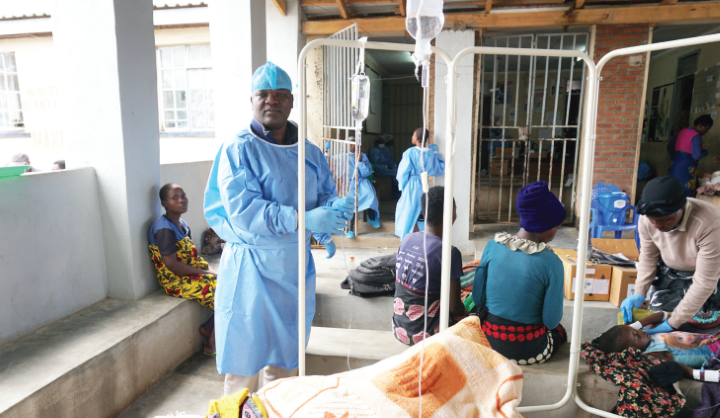Battling malaria in high risk areas
 On March 15 2013, Rt. Reverend Dr Mark Hanson, Presiding Bishop of Evangelical Lutheran Church in America (ELCA) and former president of Lutheran World Federation (LWF) arrived in the country to see the fruits of the malaria project his church is funding in Malawi.
On March 15 2013, Rt. Reverend Dr Mark Hanson, Presiding Bishop of Evangelical Lutheran Church in America (ELCA) and former president of Lutheran World Federation (LWF) arrived in the country to see the fruits of the malaria project his church is funding in Malawi.
“It is very sad that not more than 30 seconds, a child dies of malaria in Africa,” said Hanson.
Later on, during his visit to Chigumukire Feeding Centre in Salima, he said it is his hope that every child lives a happy life free of malaria.
“No child should die of malaria. No one should die of poverty,” added Hanson.
But how has the Malaria programme impacted Malawians?
A 60-year-old widow Sebastiana Gumbo of Chibothera Village in the district says that through the village savings and loans (VSL) introduced by the Evangelical Lutheran Church in Malawi (ELCM) Malaria Programme, she is able to take care of her grandsons who were orphaned a few years ago.
“When I buy and sell peanuts, I am able to feed my two grandsons. They are both in primary school. Each of them sleeps under a mosquito net,” says Gumbo.
The ELCM Malaria Programme is building capacity by providing essential drugs for under five children and pregnant women. It is also training additional staff through community-based educators (CBEs) and the initiative has the potential to develop the health sector and fight malaria effectively.
At Magubwe in Kantunda 3 Village, Traditional Authority Malengachanzi, there is a village clinic about 14 kilometres from Nkhotakota Hospital. The village, which lies along the lake, is a very underdeveloped area.
The clinic at Magubwe has no laboratory such that health workers diagnose malaria by looking at patients’ symptom.
“The church, through the malaria programme, would like to advocate the malaria rapid diagnostic test (RDT) and provision of antenatal services which are currently not available at the clinic. The RDT would help in the confirmation of malaria cases, hence prescription of the right medication,” said Judith Jere, ELCM Malaria Programme coordinator.
Magubwe, an area where pregnant women had difficulties to access antenatal health care is now a place of hope for pregnant women.
Health surveillance assistant (HSA) of Nkhotakota District Hospital responsible for Magubwe area, Mayamiko Kamala, says the programme is providing support to pregnant women and under-five children.
“This malaria programme has brought hope to people of this village. Every time we have a clinic, we conduct health talks during which we sensitise people to the prevention of malaria and HIV and Aids,” says Kamala.
However, Village Head Kantunda 3 says they have had challenges in finding malaria drugs.
“Sometimes, women are not able to access malaria drugs because they cannot be found. The district hospital does not always have medicine in stock. ELCM has worked hard on institution capacity building, but we also need prevention for pregnant women,” said Village Head Kantunda 3.
Kapiri Health Centre is another beneficiary of the ELCM Malaria Programme. It has a catchment area of about 6 000 people, a population that is quite big for a small health clinic. The health centre is run by the Christian Health Association of Malawi (Cham).
Its malaria coordinator, Mary Jere, says they used to refer 10 to 15 malaria cases per week to Nkhotakota District Hospital, but due to awareness by the church programme, they are able to handle most cases.
“ELCM has supported health centres in the programme impact areas through the provision of Fansidar (malaria prevention drug for pregnant women) targeting 25 000 pregnant women,” says Jere.
The Lutheran Communion in Southern Africa (Lucsa) is celebrating Malaria Awareness Month, and such strides in the fight against the disease are the progress needed in the malaria fight.
In Salima, Chigumukire Feeding Centre has also been receiving support from the ELCM Malaria Programme.
“Our feeding centre has 150 children. We feed throughout the year and the ELCM Malaria Programme will help sustain our children’s food supply and prevent malaria among them,” said Saukani Mandaaliponse, a caregiver at the feeding centre.
Like any other village along the lake, Chigumukire is a large community with peasant farmers who depend on small-scale farming. With sustainable livelihood as a fourth pillar of the ELCM Malaria Programme, mosquitoes have no chance to bite children as more nets will protect children’s lives and pregnant women.





